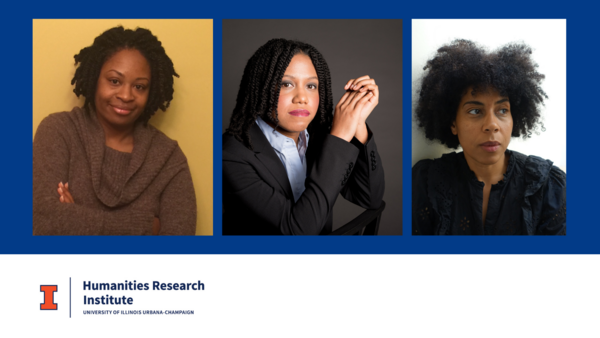
Sights and Sounds of Black Britain | Panel
- Event Type
- Lecture
- Sponsor
- Humanities Research Institute
- Location
- Levis Faculty Center, Room 210
- Date
- Apr 3, 2024 7:00 pm
- Speaker
- Caroline Bressey (Geography, University College London), Kennetta Hammond Perry (Black Studies, Northwestern University), and Rochelle Sennet (Music and Associate Dean for Diversity, Equity, and Inclusion, College of Fine and Applied Arts)
- Contact
- Humanities Research Institute
- info-HRI@illinois.edu
- Views
- 395
- Originating Calendar
- HRI
How are scholars of Black Britain addressing the many forms of erasure which Black people across the United Kingdom have faced? What does it mean to challenge a predominantly white national narrative through attention to the lives, suffering, and creative practices of Black Britons? And why is this work consequential for the way we do history now? Join us for an evening with Caroline Bressey (Geography, University College London), Kennetta Hammond Perry (Black Studies, Northwestern University), and Rochelle Sennet (Music and Associate Dean for Diversity, Equity, and Inclusion, College of Fine and Applied Arts) as they share their research on Black Britons in a variety of media.
PRESENTATIONS
Caroline Bressey: “Black Sounds in the British Victorian Archive”
In my contribution I will reflect upon the possibilities of surfacing Black sounds in the Victorian archive. I intend to do this by exploring soundscapes of Blackness and the presence of Black people in archival geographies of sound. This includes sounds created through informal chat and gossip, market cries, witness statements and songs, the informal and purposeful, the accidental and the formation of ‘sound acts’ of resistance. Moving through the records of the Victorian archive I hope to find ways to surface sounds through prison and asylum archives, theatre archives, court reports, ballads and sheet music. These will include the attempts to create new forms of Black music by the ‘Anglo-African’ composer Samuel Coleridge-Taylor who collaborated with the African American poet Paul Laurence Dunbar on a series of compositions in London in the 1890s, but also how inmates attempted to challenge the complex role of sound in prisons and asylums and how Black people challenged racism through speaking up and speaking out a scientific conferences and in lecture halls. With these sightings I hope to do two things; to consider the extent to which Black sounds can be carried through the archive; and how silences, screams and sound acts speak to broader debates on violence in colonial archives and archives of the British state.Kennetta Hammond Perry: “Unspoken Truths: The Sound of State Violence and the Archive of David Oluwale”
My remarks will draw from my work on the life and death of David Oluwale, a Nigerian-born unhoused man whom many believe to have been murdered by police in Leeds in 1969. Building from the insights of Black sounds studies, I will reflect upon some of the sonic registers of David Oluwale’s archival presence that invite the historian to listen to the violence of state power bearing down on Black life. In doing so I hope to open up a dialogue about the ways that sound studies offers useful methodological tools that can be employed in historical analysis to unsettle the power dynamics of archives designed to represent Black death to remind us of the realities Black life.Rochelle Sennet
Professor Rochelle Sennet’s recording and performing project, Bach to Black: Suites for Piano, highlights the piano suites of Black composers, and pairs their works with the keyboard works of J.S. Bach. Today’s presentation will highlight two important British composers of African descent from the project: Amanda Aldridge, also known as Montague Ring (1866-1956), and Samuel-Coleridge Taylor (1875-1912). In addition to a discussion on the composers’ advocacy for Black culture and the historical significance of their musical works, the aim is to also summarize important contextual questions about race in Classical music of Black Britain during the late 19th and early 20th centuries. In addition, the goal is to further illustrate how historical context and descriptive language have changed over time with musical titles and idioms, and how we can acknowledge our challenging racial past.